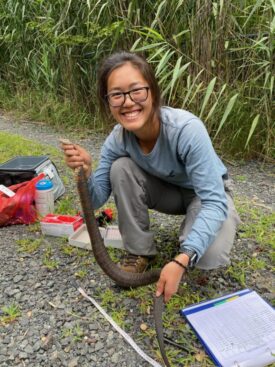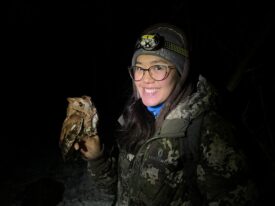
Morgan Mark SEBS’22. Courtesy of Morgan Mark.
Donna Fennell, professor and chair of the Department of Environmental Sciences, saw firsthand the passion of wildlife enthusiast Morgan Mark, Rutgers Honors College graduate with a dual degree in Bioenvironmental Engineering from the School of Environmental and Biological Sciences (SEBS) and School of Engineering.
“During a trip by Environmental Engineering seniors to a local waterway to investigate water quality parameters as part of a lab class, Morgan arrived fully equipped with outdoor gear, binoculars and an app to identify plants and wildlife. In addition to working with others to perform the work, she continually updated us on the identities of the birds and plants we encountered. It made the morning a lot of fun!”
“I always strive to do my best at anything I tackle, from homework to workouts,” says Mark, who is meticulous and highly focused.

Morgan Mark collecting swab samples from a northern water snake to investigate the prevalence and seasonality of snake fungal disease. Photo: Tyler Christensen.
It shows. Mark enjoys a perfect 4.0 GPA in a demanding major. She is undertaking a rigorous senior honors thesis, conducting research on snake fungal disease as a George H. Cook Scholar. She is actively involved in extracurricular activities. She’s already enrolled in a doctoral program in Ecology and Evolution this fall, where she will continue her wildlife research. In particular, she will study whether SARS-CoV-2, the virus responsible for COVID-19, is present in wildlife populations, and if so, the potential for transmission back to humans.
“Since so little is known about the future trajectory of wildlife diseases and zoonoses—illnesses that can spread from animals to humans—epidemiological research is critical for protecting ecological and public health. After earning my doctorate, I hope to become a researcher and professor of wildlife epidemiology who devises strategies that protect both humans and wildlife.”
A well-mapped out future for this self-described “well-rounded and balanced individual.” Except the path was not so clear a couple of years ago.
A meticulous planner, Mark always believed she needed to do things a certain way. This mentality worked until the COVID-19 pandemic turned her life—and everyone else’s—upside down.
“Fear was becoming a part of my daily life, from being scared for the well-being of my friends and family to wondering what would happen to a world sentenced to lockdown. And seemingly less critical, but equally as devastating to a college student, were the nightmares of not graduating and losing a dream engineering internship. Every aspect of my life—academic, social, physical—was in limbo, and I realized I was served something I couldn’t plan for.”
Despite the uncertainty, Mark allowed herself to take a deep breath and reevaluate.
A career mentor through the Office of Career, Exploration, and Success’ Road to Food, Animals, and the Environment Mentorship Program connected her with Conserve Wildlife Foundation of New Jersey (CWF), a nonprofit dedicated to protecting the state’s imperiled species.
Despite there being no connection to engineering, she applied for CWF’s summer internship position.
“On my first day on the job, I was up to my hips in a marsh looking for New Jersey’s smallest, and most elusive, turtle. Every day was a new adventure. I filmed carnivorous plants devouring unsuspecting insects and ran in the rain helping amphibians cross busy roads. Since that formative summer, I realized I wanted to study wildlife and wildlife diseases.”
Her love for animals and nature was rejuvenated. “I never could have predicted I would have this eureka moment, but I’m beginning to believe that life is a little better without a plan.”

Morgan Mark conducting nighttime research on owls. Courtesy of Morgan Mark.
Wildlife research has become a major passion and she looks forward to searching for owls in the night and observing bats in caves. Her classes, research experiences, and extracurricular activities have made her “undergraduate years a truly amazing experience.”
“My time at Rutgers has given me not only a solid foundation, but connections and lessons I will cherish for the rest of my life.”
What made you choose SEBS and Rutgers?
When you’re 18 years old, it’s difficult to know what you want to do for the rest of your life—I had no idea when I graduated from high school. Applying for colleges was tough because there were so many avenues to explore: biology, medicine, engineering. But, the two certainties were my love for animals and my desire to better the environment for both people and wildlife. When I learned about SEBS’ amazing diversity of courses, professors, and people, I knew this school was the perfect fit.
What drew you to the Bioenvironmental Engineering program?
I discovered the Bioenvironmental Engineering program quite by chance. While perusing the SEBS major catalog, the program caught my eye, prompting me to visit the website. Something clicked while I browsed through the course requirements and read about the Rutgers Cooperative Extension Water Resources Program’s work designing and constructing rain gardens to improve stormwater management. This major seemed like the perfect combination of mathematics and environmental sciences, and knew I wanted to be a Bioenvironmental Engineer.
Can you describe your senior honors project and why you choose the topic?
I embarked on my George H. Cook (GHC) project to determine whether there are seasonal patterns in a wildlife disease known as snake fungal disease (SFD) in Eastern copperheads. Ever since I completed an Environmental Toxicology term paper on how man-made chemicals affect wildlife diseases, I have been interested in learning more about reptile and amphibian illnesses. When I reached out to Dr. Brooke Maslo in the Department of Ecology, Evolution, and Natural Resources, she surprised me with the perfect opportunity: a project examining SFD in snake species of conservation concern. I immediately knew this was the perfect topic for my GHC thesis and a springboard for my career in wildlife epidemiology.
Please describe your student life activities.
I have been actively involved on campus since my freshman year. I am currently the president of RU Compost and the Rutgers Student Chapter of The Wildlife Society (RUTWS) as well as the Recording Secretary and University Affairs Chair for the SEBS Governing Council. As RUTWS president, I have organized Northern Saw-whet Owl bandings, bat house builds, and wildlife restoration volunteering days, which give members valuable hands-on experience in the field. I am also an active member of Students for Environmental Awareness (SEA), Students for Environmental and Energy Development (SEED), and the Herpetology Club. Besides clubs, I am also an avid researcher who works with snakes, bats, owls, and songbirds. I also assist with Dr. Maslo’s Woodbridge, NJ, wetlands restoration project and am a wildlife educator who hosts bat walks and herpetology outings for the public. One of the most gratifying experiences is helping people discover the amazing wildlife diversity right outside their door.
What are some of the more important ways in which you serve your community?
I participate in litter cleanup, food pantry, and educational outreach volunteering opportunities. I have been involved with Rutgers’ Scarlet Days of Service every year, helping construct and maintain the Cook Campus Conservation Garden and Rutgers Gardens. I enjoy giving back to the School of Engineering community as an advocate, presenting at open houses, answering prospective students’ questions, and contributing to school apps such as our Google Poly and Mobile Guidebook App.
What do you do in your free time?
In my free time, I enjoy hiking in the Livingston Ecological Preserve and taking advantage of Rutgers’ amazing Recreation Facilities. I have participated in Rutgers’ Big Chill 5K for the past four years and Rutgers half marathons. The greatest part about campus life is that there’s something for everyone, from Beats on the Bank to Rutgers Day. I also enjoy writing, and my articles have been featured in New Brunswick Today, the Honors College Student Blog, and the Environmental Engineering Department website.
Which one of your many accolades are you most proud of?
I am most proud of being awarded the Association of Reptile and Amphibian Veterinarians (ARAV) and Research Grant along with fellow graduate students Tyler Christensen and Bobby Kwait to fund our SFD research. Since this was my first grant proposal, receiving this funding was both a personal and professional achievement. As a budding academic, learning to draft effective proposals is a critical skill, and I look forward to presenting the results of our research in the ARAV Journal of Herpetological Medicine and Surgery.

